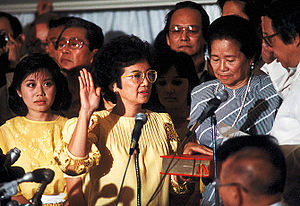
Word of the Day: Infantilize
Today’s word of the day, thanks to the Merriam-Webster Dictionary website, is infantilize, a verb which means “to make or keep infantile,” or “to treat as if infantile.” According to www.dictionary.com, infantilize means “to keep in or reduce to an infantile state,” or “to treat or regard as infantile or immature.”
If you go to www.etymonline.com, you won’t find infantilize. It’s a verb created from the adjective infantile, which you will find with this explanation: “mid-15c., ‘pertaining to infants,’ from Late Latin infantilis ‘pertaining to an infant,’ from infans ‘young child’ (see infant). Sense of ‘infant-like’ is from 1772.” If you take the further step of looking up infant, you will find this: “late 14c., infant, infaunt, ‘a child,’ also especially ‘child during earliest period of life, a newborn’ (sometimes meaning a fetus), from Latin infantem (nominative infans) ‘young child, babe in arms,’ noun use of adjective meaning ‘not able to speak,’ from in- ‘not, opposite of’ (see in- (1)) + fans, present participle of fari ‘to speak,’ from PIE root *bha- (2) ‘to speak, tell, say.’”
What is clear about the history of the word is that it must have started with the idea that small children have not yet learned how to speak. But the broadening of the word occurred long before the word entered the English language, according to etymonline.com: “The Romans extended the sense of Latin infans to include older children, hence French enfant ‘child,’ Italian fanciullo, fanciulla. In English the word formerly also had the wider sense of ‘child’ (commonly reckoned as up to age 7). The common Germanic words for ‘child’ (represented in English by bairn and child) also are sense extensions of words that originally must have meant ‘newborn.’” (BTW, “Broadening is a type of semantic change by which the meaning of a word becomes broader or more inclusive than its earlier meaning. Also known as semantic broadening, generalization, expansion, or extension” [https://www.thoughtco.com/broadening-semantic-generalization-1689181].)
On this date in 1986, the Philippines held a presidential election. The election had been called by Philippine president Ferdinand Marcos as an attempt to ensure the rest of the world, or at least the rest of the Western world, that his government was legitimate. His opponent in the election was Corazon Aquino, the wife of the late Senator Ninoy Aquino, who had been murdered by the Marcos regime in 1983.
Ferdinand Marcos got involved in politics in the 1950s, and in 1965 he was elected to be the 10th president of the Philippines. In 1972, he declared martial law and ruled the country as a dictator for most of a decade. Part of his reason was quite simply that the president was limited to two four-year terms, and Marcos was not ready to stop ruling. He finally held another election in 1981, but the rules had been changed.
Aquino described herself as a housewife, but after her husband’s assassination, she became active in Philippine politics and gradually became the leader of the opposition to Marcos. She initially objected to her husband’s entry into politics, particularly in opposition to Marcos, but in 1978, get involved he did. After the 1981 election, the Aquinos left the island for the USA, but in 1983, Ninoy Aquino decided to return. He was murdered by some of Marcos’s men upon his return. Corazon Aquino returned from the USA to lead is funeral possession, which was attended, some say, by 2,000,000 people.
The 1986 election was rife with fraud and violence. Computer technicians working on the count walked out on the counting to protest the fraud. But Marcos declared himself the winner.
Then the impossible happened. Leaders in the military declared that they were convinced that Aquino had won the election and that they would support her. Marcos fled the country, and Aquino returned in triumph to lead the country.
It is asserted that in Western, capitalist countries, like the USA and the Philippines, women’s voices are not heard, that these countries and societies are so patriarchal that the women have no say in anything that goes on. But Corazon Aquino’s story proves that even in a highly paternalistic dictatorship, a woman can speak out loud and clear, and she can make a difference. Any suggesting that women don’t have such power is an effort to infantilize women.
The image is a press photo: “Corazon Aquino takes the oath of office before Chief Justice Claudio Teehankee Sr. in Club Filipino, San Juan on 25 February 1986” (https://en.wikipedia.org/wiki/Corazon_Aquino#1986_presidential_campaign).
BTW, in case you missed it, yesterday’s word of the day was “flooding.” That’s because our basement flooded after all the rain we had, so I did not get a word of completed.